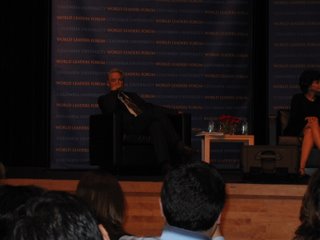Soros
 As in George Soros, the billionaire financier. Soros is a name that nearly everyone in the financial community will know, and that many outside the community very well may.
As in George Soros, the billionaire financier. Soros is a name that nearly everyone in the financial community will know, and that many outside the community very well may. To go backwards for a minute, when I was in community college back in Seattle, trying to figure out “what I wanted to be when I grew up”, there were two men who’s writings and examples deeply influenced me. The first of was George Soros. (The other was Robert Kiyosaki, author of a well-known book called ‘Rich Dad, Poor Dad’) I’d read about men who’d worked on Wall Street, made a ton of money, and then became philanthropists and gave most of it away, but I’d never read about anyone doing it with such sophistication as Soros did. He didn’t just find aid agencies and cut them large checks, he actually looked for creative programs he thought would make concrete differences in people’s lives, or where they didn’t exist, created his own. One thing I’ve noticed (and this is changing more & more) is that many people want to donate money to ‘a good cause’, but figuring out how to achieve the objectives can often be tricky. As an example of what Soros did differently, he’s originally from Hungary and grew up under the Nazi occupation, so when he started working in Eastern Europe during the Cold War, he knew he wanted to work against the oppressive governments there. Instead of trying to organize protests or arm freedom fighters, he did something very clever; he bought all the universities in those countries a large number of photo copiers. He knew that there were people with ideas other than communism, but information dissemination was hard. So he found a seemingly harmless way to begin to open up those societies by promoting the spread of information.
Now, I know in some places Soros is not at all very popular. He made a lot of his money in currency speculation, and has been accused of such things as insider trading and contributing to the East Asian Financial Crisis. I’ve also heard some people here in this town say that much of what he did was just clever insider trading, and that he’s really not as smart as he’s cracked up to be (and by extension, not such a great guy). Honestly, some of these critiques may be fair. I don’t know enough yet to properly evaluate them myself, but some of what I’ve heard seems plausible.
Regardless though, his example inspired me when I was younger, and while I’d feel sad to find that his methods were not ethical, I still draw inspiration from what he did. So I was VERY excited to hear he was coming to the school to speak.
His speech was interesting, he speaks with a very strong accent (I assume it’s a Hungarian accent), and while he isn’t the greatest speaker I’ve ever heard (that honor goes to Bill Clinton, as I talked about in a previous post), he was articulate, passionate about his ideas, and pretty natural all things considered; he knew what he wanted to say & didn’t read from notes. He said a few things I thought were interesting. (If you’re not interested in Econ or Finance, these things might seem obscure so you can skip to the end of the post if desired)
- He feels that most of the problems of poverty and misery in the world are the fault of bad governance. This isn’t surprising coming from him, since his Open Society Foundation heavily promotes democracy and governmental accountability. But I didn’t expect to hear him pin so much on bad pols. I wish I’d been able to read ‘End of Poverty’ by Jeff Sachs, so I could know if Sachs agreed with him or not. I’m not sure I’d go as far as this myself, though bad governments certainly do a lot of harm, and in some places are the worst problem.
- He feels one of the biggest problems with globalization is the asymmetry of labor and capital. One of the ideas behind globalization is that labor and capital can move around freely, and thus more efficiently. This is certainly true for capital, given how interconnected the banking system is now. But it is certainly NOT true for labor. I might be a manufacturer in a third world country, who knows he could make more if I produced and sold in another market. But I may not be able to just move to another country or market at will, for a number of reasons. (Having enough money to afford the move, getting a visa, other governmental issues, language, etc) So while capital is free to move, labor often isn’t. This was a good insight to me.
- He also thinks (speaking about Stiglitz work) that asymmetry of info isn’t as important or relevant in financial markets, since a large part of finance is trying to anticipate the future. (Will the market go up or down?) This was also a good insight that wouldn’t probably have occurred to me.
Even though he didn’t talk for long, and even though he was mostly commenting on Stiglitz’s book, I still felt it was a privilege to go and hear my other great hero from my earlier years speak. (I’d heard Kiyosaki speak before)


0 Comments:
Post a Comment
<< Home